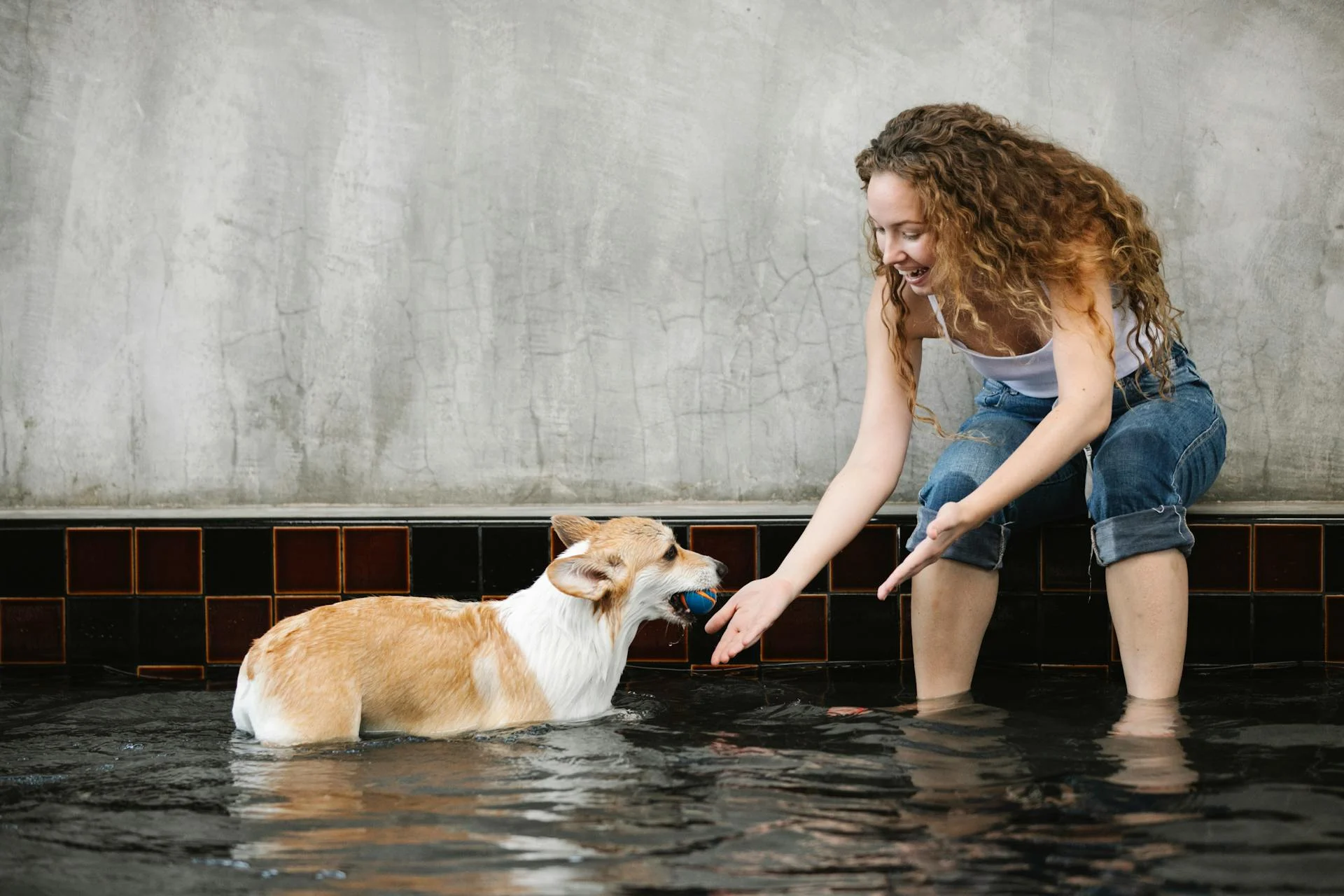
Goldendoodles can be a handful, especially during the first two years of their life. They tend to be most energetic and rambunctious between 6 to 18 months.
As they mature, their energy levels decrease, but it's not a linear process. Goldendoodles typically hit their full growth spurt around 12 to 18 months, which can be a challenging time for owners.
With consistent training and socialization, Goldendoodles can learn to calm down and mature into calmer dogs. Their adult temperament is largely determined by their genetic makeup and early life experiences.
Puppyhood and Development
Puppyhood is a whirlwind of energy and growth, and understanding this stage is key to helping your Goldendoodle calm down. Goldendoodle puppies sleep a lot – up to 18 hours a day! This rest is crucial for their development.
Building a routine is essential for eliminating boredom, which can lead to misbehaviors. A structured play schedule, including regular play sessions and hiding treats around the house, can help channel their energy into positive outlets.
As your puppy grows, they'll start to test boundaries and exhibit undesirable behaviors like chewing and mouthing. Providing appropriate chew toys can help save your belongings and your fingers.
You can expect puppyhood to last until around 16 weeks, with personality and breed determining the exact age of calmness. During this time, teething will start, making it hard for your puppy to be calm.
To navigate this stage, focus on patience, consistency, and positive reinforcement. Here are some key components to keep in mind:
- Regular playtime to help them expend energy
- Variety of toys, including chew toys, balls, and interactive puzzles
- Structured play that incorporates basic training commands for mental stimulation
- Monitoring play intensity to protect their developing bodies
Remember, training will need to be stepped up during this period as your pup will begin to test the boundaries of what they can and can't get away with.
Broaden your view: Does Getting a Dog Fixed Help with Aggression
Contributing Factors and Management
Breeding plays a significant factor in determining the age your Goldendoodle calms down, but it's not the only factor.
The puppy's sex, the presence of other pets in the household, and the individual dog's temperament all affect their maturation process and when they settle down.
Training will be slower or faster depending on the dog you bring home, and finding the right balance between play, training, rest, and socialization is key to ensuring they grow into well-adjusted adults.
- Regular Playtime: Engage in regular play sessions to help them expend energy.
- Variety of Toys: Offer a range of toys, including chew toys, balls, and interactive puzzles.
- Structured Play: Incorporate basic training commands into playtime for mental stimulation.
- Monitor Play Intensity: Ensure play is gentle to protect their developing bodies.
Goldendoodles are most hyper during the early stage of life, then become a little more docile at three years old and calm down a lot by the time they reach 10.
Early Socialization Tips
Early socialization is a crucial period for Goldendoodle puppies, setting the stage for their future interactions with the world. This is not just about teaching them to be friendly, but also about helping them understand that the world is a safe and interesting place.
Meet new people and pets: introducing your puppy to a variety of people and friendly pets is essential for their social development. This can be done in a controlled environment, such as a puppy class or a quiet park.
Recommended read: Dogs from Puppy Mills Behavior
Explore new environments: take your puppy to different places to experience new sights and sounds. This can be as simple as walking around the block or visiting a nearby pet store.
Encourage positive interactions: reward your puppy for calm and curious behavior in new situations. This will help them associate new experiences with positive outcomes.
Socialize safely: ensure all interactions are controlled and positive, especially with other animals. This means supervising interactions closely and intervening if your puppy appears uncomfortable or stressed.
Here are some specific socialization activities you can try with your Goldendoodle puppy:
- Meet new people and pets
- Explore new environments
- Encourage positive interactions
- Socialize safely
Remember to consult with your vet before starting any socialization activities to ensure your puppy is healthy enough and to discuss their vaccination needs and schedule.
Contributing Factors
Training can be slower or faster depending on the dog you bring home, the puppy's sex, and whether you have any other pets.
Breeding plays a significant factor in determining the age your puppy calms down.

The first three years of a goldendoodle's life are jam-packed with playtime and high-energy behavior.
Puppy-like behavior in goldendoodles can continue even after they lose their puppy teeth at around six to eight months old.
Doodles are most hyper during the early stage of life, and become more docile at three years old.
By the time goldendoodles reach 10 years old, they calm down a lot.
A different take: 5 Month Old Dog Training
How to Manage Your Puppy
Managing your puppy's energy is crucial for their development and your sanity. A Goldendoodle puppy can sleep up to 18 hours a day, but they still need regular playtime to expend their energy.
You can help manage your puppy's energy by engaging in regular play sessions, offering a variety of toys, and incorporating basic training commands into playtime for mental stimulation.
To prevent hyperactivity, establish a routine and provide positive outlets for your puppy's energy. This can include play sessions with chew toys or squeaky toys, and hiding treats around the house.
Related reading: How Long Should a Dog Training Session Be
You should also be patient and consistent in your approach, as puppies can test boundaries and assert dominance. Positive reinforcement and rewards can help them learn good behavior.
Here are some key activities to help manage your puppy's energy:
- Regular Playtime: Engage in regular play sessions to help them expend energy.
- Variety of Toys: Offer a range of toys, including chew toys, balls, and interactive puzzles.
- Structured Play: Incorporate basic training commands into playtime for mental stimulation.
- Monitor Play Intensity: Ensure play is gentle to protect their developing bodies.
By adapting play and exercise routines to suit your puppy's changing needs, you can help them stay happy and healthy throughout their behavior stages.
Does Neutering Affect Behavior?
Neutering can have a significant impact on a dog's behavior, especially as they age.
Spaying dogs doesn't alter their personality, so a happy, bouncy pup will still be happy and bouncy.
Neutering can reduce aggressive acts and territorial marking in dogs.
Your older dog will be less of a puppet to their hormones, which can lead to a more relaxed demeanor.
The idea that neutering makes dogs calmer is a common misconception, but it's not entirely untrue.
While neutering won't change a dog's fundamental personality, it can impact their mood and behavior.
Age-Related Calming
As your Goldendoodle grows, you can expect their energy levels to change. Puppies are at their most hyper between 10-16 weeks, also known as the teenage phase. During this stage, they'll test boundaries and exhibit mischievous behavior if bored.
At around 6-12 months, they may experience another surge in energy, requiring continued training, socialization, and play sessions to redirect their behavior. With patience and positive reinforcement, you can help your puppy develop good habits and a calm demeanor.
As your Goldendoodle matures, you can expect them to calm down significantly, becoming increasingly docile with age. By around 8-12 years, they'll have reached their golden years, where they'll prefer more leisurely activities and quiet moments with you.
Puppy Sleep Patterns
Goldendoodle puppies sleep a lot – up to 18 hours a day! This rest is crucial for their development.
A typical day for a Goldendoodle puppy is a pattern of play, eat, and sleep, which helps in their growth and development.
Discover more: Crate Training a Dog during the Day
They often spend most of their day sleeping, so it's essential to create a calm and quiet environment for them to rest.
Understanding and nurturing these behaviors in your Goldendoodle puppy will not only aid in their development but also strengthen the bond between you and your pet.
As they grow and mature, their sleep patterns will change, but establishing a consistent routine from an early age is key to their overall well-being.
What Age Do Dows?
Puppies change as they age, and their energy levels follow a rough timeline as they grow into adult dogs.
Between 10-16 weeks, puppies are at their most hyper, also known as the teenage phase, where their rebellious streak kicks in.
Their energy levels can also spike again between 6-12 months of age, bringing continued boundary testing and mischievous behavior if they become bored.
Most goldendoodles calm down significantly once they reach adulthood, then become increasingly docile as they age.
Curious to learn more? Check out: Crate Training Schedule by Age
Goldendoodles tend to be high-energy and boisterous pups right through their lives, which many owners love about them.
You can expect puppies to start acting up and ignoring commands between 10-16 weeks, so it's essential to persevere with basic dog training and positive reinforcement.
With consistent training, socialization, and play sessions, you can redirect that mischievous energy and keep your puppy physically and mentally engaged.
As goldendoodles age, they become increasingly docile, making them a great pet for families with children.
Reduced Activity
As your Goldendoodle ages, you may notice a significant change in their energy levels. They may prefer tranquil activities and show less interest in high-energy games. This is a common behavior in senior Goldendoodles.
One of the most noticeable changes is a decline in energy, with your once lively companion now enjoying shorter walks and more time resting. This is a natural part of the aging process.
In senior years, Goldendoodles often prefer leisurely strolls and quiet moments together. This change can deepen your bond and teach you the value of patience, understanding, and adapting to their evolving needs.

Here are some things to expect from your senior Goldendoodle's reduced activity level:
- Shorter walks: Your Goldendoodle may prefer shorter walks and more time resting.
- Leisurely strolls: They may enjoy leisurely strolls and quiet moments together.
- Cozy spots: They may choose to rest near you in soft, cozy spots around the house.
It's essential to recognize and adapt to these changes to provide your aging companion with the love, care, and comfort they deserve. By doing so, you can enrich their golden years with dignity and warmth.
Altered Sleep Patterns
As our Goldendoodles age, their sleep patterns undergo a significant change. Senior Goldendoodles often sleep more than they did in their younger years.
This increased need for rest is a natural aspect of aging. It's essential to provide them with a comfortable, quiet space for their extended naps.
A peaceful environment is crucial for your senior Goldendoodle's well-being, so consider setting up a cozy resting area in your home.
Worth a look: Do Goldendoodles Sleep a Lot
Experiencing with My Dog
As I've experienced with my own Goldendoodle, the senior years are a time of significant change, both physically and behaviorally. This stage is characterized by a decline in energy, with your once lively dog preferring tranquil activities and shorter walks.
One of the most noticeable changes is their reduced interest in high-energy games. I've noticed that my dog now enjoys leisurely strolls and quiet moments together, rather than the long walks we used to take.
According to various sources, including the American Kennel Club, Goldendoodles tend to calm down significantly once they reach adulthood, then become increasingly docile as they age. This is a natural process, and with patience and understanding, you can help your dog navigate this transition.
During this stage, it's essential to adapt to their evolving needs and provide them with the love, care, and comfort they deserve. This includes recognizing and responding to their preferences for softer, cozier spots around the house.
Here are some key changes to expect during the senior years:
By understanding and responding to these changes, you can help your Goldendoodle live a happy, comfortable, and dignified life in their golden years.
Exercise and Training
As a Goldendoodle owner, you're likely no stranger to the breed's boundless energy. But when do Goldendoodles calm down? The answer lies in understanding their exercise and training needs.
Exercise is paramount for Goldendoodles, with daily walks split into two sessions being ideal. The amount of exercise varies depending on the dog's stage of development: 15 minutes, twice a day for puppies up to three months, 20 minutes, twice a day for puppies up to five months, 25 minutes, twice a day for puppies up to six months, and 30 minutes, twice a day for puppies eight months and upwards.
Regular exercise helps prevent hyperactivity, and it's essential to provide mental stimulation through activities like obedience training, agility training, or interactive toys. You can also try crate training, which provides a safe space for your pup to settle and can help them differentiate between 'chill time' and 'go time'.
To manage your puppy's energy, build a routine with structured play sessions, incorporating basic training commands into playtime for mental stimulation. Offer a variety of toys, including chew toys, balls, and interactive puzzles, and monitor play intensity to protect their developing bodies.
Here's a rough guide to help you understand your Goldendoodle's exercise needs:
Remember, consistency is key when it comes to training and socialization. Positive reinforcement is a good strategy, but be sure to only reinforce the behaviors you want to see continued. If you make a fuss of your fur baby when they're running around or jumping up, you're telling them that this is the right thing to do.
By understanding and managing your Goldendoodle's energy levels, you can help them grow into well-adjusted adults. So, be patient, stay calm, and provide the right amount of exercise and training, and your Goldendoodle will thank you.
Sources
- When Do Puppies Calm Down? At What Age? - Wild Earth (wildearth.com)
- energy levels (purina.com)
- Goldendoodle Energy Levels: Will My Hyper ... (prideandprejudoodles.com)
- LinkedIn (linkedin.com)
- reddit (reddit.com)
- When Do Goldendoodles Calm Down? Behavior Stages & ... (doodledoods.com)
Featured Images: pexels.com


